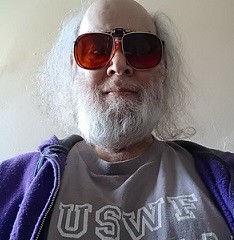Thursday, September 26, 2019
No Holds Barred: Professor Mo on 52 Blocks Self-Defense System
On this edition of No Holds Barred, host Eddie Goldman once again spoke with martial artist Mahaliel Bethea AKA Professor Mo AKA Sensei Mo.
Our main topic was the urban self-defense system known as 52 Blocks.
We spoke with him by phone Wednesday.
52 Blocks, he said, is an "urban self-defense system, because it's not a traditional martial art. Some people connect it with prison, and the researchers really connect it all the way from Africa. And because of mass incarceration obviously, prison becomes a breeding ground, a kind of gladiator, where people are able to try out their skills in the 52 Blocks.
"And the 52 Blocks evolved. It evolved from the Virginia Shuffle," he continued. "The slaves came into Virginia, so obviously Virginia was the first port. And it's called the Virginia Shuffle. And then later on it became wall fighting. And then it became stato. And then some people called it Jailhouse Rock. And now it's called the 52. And the 52, because there's a little more playing with the cards, and the 52 cards in the deck.
"So that's why the 52 Blocks became popular."
Because of its history as a grassroots and underground self-defense fighting system, mainly centered in the African-American community and under incredibly brutal and oppressive conditions, 52 Blocks has lacked any common curriculum or organization.
That also is starting to change, as Professor Mo will be hosting a 52 Blocks certification seminar in Harlem, New York, on Saturday, October 19. While details of how to register will be posted shortly, plans are also in the works for a 52 Blocks Federation.
But, as he stressed, 52 Blocks is a self-defense system and not the same as a sport. Even with a more developed curriculum, however, it still will largely be an "improvisational art".
The 52 Blocks curriculum will include defense against weapons, including sticks, knives, and guns, and also against dogs.
We also discussed more on the plans for the October 19 seminar, how his Fight Back MMA school in Harlem is the only one in New York instructing people in 52 Blocks, more on the self-defense techniques of 52 Blocks, how 52 Blocks is related to boxing, how instruction in the 52 Blocks is expanding to more places in the U.S., recent coverage of 52 Blocks and an interview with Professor Mo in Black Belt magazine, and much, much more.
You can play or download No Holds Barred here and here. If one link does not work, please try another.
No Holds Barred is available at Google Play Music.
Also, No Holds Barred is available at Apple Podcasts.
You can also listen to No Holds Barred via Stitcher through iOS or Android devices or on the web here.
The PodOmatic Podcast Player app is available for free, both for Android at Google Play, and for iOS on the App Store.
The No Holds Barred theme song is called "The Heist", which is also available on iTunes by composer Ian Snow.
No Holds Barred is sponsored by:
The Catch Wrestling Alliance, resurrecting and promoting the sport of authentic catch-as-catch-can wrestling. The Catch Wrestling Alliance provides tournaments, seminars, and training as well as education about catch wrestling. Join the movement and keep real wrestling alive. For more information, go to CatchWrestlingAlliance.com.
Skullz Double-End Bags, the perfect bag for your combat sports training. Skullz Double-End Bags provide a realistic striking target, and help improve timing, distance, and hand and eye coordination. Hang it and hit it right out of the box! No pump required. For more information, go to SkullzDeBags.com.
Labels: 52 Blocks, Africa, African-American, boxing, Eddie Goldman, Harlem, Mahaliel Bethea, martial arts, No Holds Barred, Professor Mo, self-defense, Sensei Mo
Thursday, May 01, 2008
Columbia 1968 Rebellion: The Role of the Black Students and Harlem Community
This past week, from April 24 to April 27, 2008, many veterans of the spring 1968 strike and protests at Columbia University in New York returned to the campus for a conference to mark the 40th anniversary of that event. This gathering also served as a sort of reunion for those who were activists at Columbia and Barnard in those days, including, of course, many who remain active today in various political and social movements.
Back in 1968, I was a freshman at Columbia. Those events, which took place in the context of the growing Black liberation movement in the U.S. and the worldwide struggles against the war in Vietnam, among many other international rebellions and revolts, profoundly changed my life and thinking. They opened my eyes quite wide about some of the horrors going on around the world, and drew me into political activism with their irresistible slogan: Join us!
Today, however, many do not understand what took place or why. Numerous attacks on the protesters have been circulated, especially in the mainstream media, as usual a primary source of confusion, distortion, and lies.
Despite the severe shortcomings of some of the political tendencies which played a key role in those events at Columbia, especially among the leaders of SDS (Students for a Democratic Society, which I joined shortly after the strike of spring 1968), it is my belief as it was then that the basic demands of those actions were just. They sought an end to the building of a university gymnasium by the elite, private Columbia University in nearby Morningside Park, which is public land in Harlem, an end to university involvement in war research, and several related issues.
One of the most distorted features of this struggle involves the role of the Black students. Many accounts talk of the uprising by white students on this Ivy League campus, but either omit or downplay the crucial leadership role played by the Black students and their organization, the Students Afro-American Society (SAS). Still less is recorded about the role of activists from the Harlem community in leading the struggle against the gym, and in assisting the students when they struck Columbia and occupied campus buildings.
Now a new documentary film is trying to set the record straight. It is called "!VALA! The Power of Black Students at Columbia University 1968-2008". This film is the brainchild of Sherry A. Suttles, Barnard class of 1969, who is the film's executive producer, and was a student activist and SAS member in those days. The producer and director of the film is Kamau Suttles, her son.
Right after a screening and discussion of "!VALA!" this past Saturday, April 26, at this Columbia 1968 conference, we spoke about this film and its message with Sherry A. Suttles, Kamau Suttles, and activist Samuel White Jr., Columbia class of 1968.
You can listen to this lengthy interview for free by clicking here.
Thanks, Eddie Goldman
(Note: This show is not part of the NO HOLDS BARRED series, which will return later this week.)
Labels: 1968, Barnard, Black liberation, Columbia, Eddie Goldman, gym, gymnasium, Harlem, Kamau Suttles, Morningside Park, protest, racism, Samuel White, SAS, SDS, Sherry Suttles, strike, student, Vietnam war
















